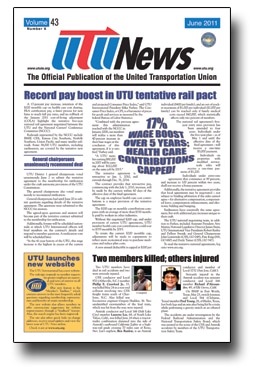Effective July 1, 2016, rail employees covered under The NRC/UTU Health and Welfare Plan and The Railroad Employees National Health and Welfare Plan will see their monthly Health and Welfare contribution increased from the current $198.00 per month, to $228.89 per month.
Why the increase?
Since July 1, 2012 and pursuant to provisions of the September 16, 2011 National Rail Agreement, the health and welfare contribution was frozen at $198.00 per month. That agreement also contained provisions to increase the contribution amount to a maximum of $230.00 per month, effective July 1, 2016.
A national rail agreement is currently being negotiated and the new monthly contribution amount will remain in effect until modified.
How is the increase determined?
The formula used in determining the monthly employee contribution takes into account the Carriers Monthly Payment Rate for everything other than on-duty injury health care benefits, and the payment rates for benefits under The Railroad Employees National Dental Plan and The Railroad Employees National Vision Plan. The employee contribution is 15 percent of such monthly payment rates.
Tag: national rail agreement

(1991-1995)
Having served as a member and as chairperson of UTU national negotiating committees, and as a UTU International officer for 28 years, I found that the failure to reach an agreement on the national level carries the risk of having third party recommendations placed in effect by Congress.
In my 36 years of service, those decisions by Congress never were in favor of the worker – even when Democrats controlled both the House and Senate.
In today’s increasingly conservative and anti-labor political climate, allowing a presidential emergency board and Congress to determine our contract terms would be the same as our adopting the Section 6 notices of the carriers.
No national agreement has ever been perfect. This agreement is extraordinary in terms of what other labor unions have been able to achieve. A failure to ratify this agreement could be devastating to our membership.
Assistant President Arty Martin

That cap alone is worth more than $5,000 over the life of this agreement. In fact, not a penny of the wage increases negotiated is to be offset through higher health care insurance contributions for 6½ years, which is 1½ years beyond the term of this agreement. For many members, there could be a reduction in out-of-pocket costs for doctor visits and prescription drugs.
In addition to the 17-percent wage increase, which is actually 18.24 percent when compounded, we have negotiated additional pay for every FRA-certified job, a faster process for new hires to reach full pay, cash payments to those still under the five-year service scale, no work rules concessions and a process for local negotiations on alternative compensation, compensation enhancement and electronic bidding and bumping.
General Chairperson (NS GO 680) Pate King

I shudder to imagine what the current anti-labor chairman of the House Transportation & Infrastructure Committee, John Mica (R-Fla.), might have in store for us if we vote down this agreement and turn our fates over to third parties.
This agreement deserves to be ratified on its merits. It is the very best agreement we could gain in this difficult economic and political environment.
International Vice President Delbert Strunk

Additionally, general chairpersons have the opportunity to negotiate issues on the property relative to electronic bidding and bumping, as well as enhanced benefits. This is especially important for NS and CSX committees.
Every cent that could be gained at the negotiating table was squeezed from the carriers. No other organization has done better, period! This agreement should be ratified by our members.
International Vice President Robert Kerley

All this is without any work rule concessions that have historically accompanied such gains. I wholeheartedly endorse this proposal for ratification.
General Chairperson (CSX GO 049) John Lesniewski

increase (18.24 percent when compounded), certification pay and a condensed new-hire service scale for the alternative of an imposed settlement decided by a third party. Historically, having a third party-imposed settlement has fared poorly for labor.
Entering these negotiations, I didn’t anticipate we could roll back our members’ health care contributions to $200 monthly and freeze them for 6½ years. The health care cost issue isn’t going away, and we met it head on, minimizing the impact on UTU members in a responsible way.
We cannot simply bury our heads in the sand and ignore the current state of the economy, escalating health care costs, the high unemployment rate, and recent wage and health care settlements made by other organizations that are well below what we have negotiated.
Alternate International Vice President Doyle Turner
 Our members need to consider today’s double digit increases in health care costs.
Our members need to consider today’s double digit increases in health care costs.I fully support this proposed agreement and urge a “yes” vote.
National Legislative Director James Stem

Also to be considered is how the U.S. House of Representatives, controlled by political extremists, is attempting to reduce Railroad Retirement, Social Security and Medicare benefits, eliminate Amtrak and slash transit subsidies.
It would not be wise for us to ask Congress, already in gridlock over economic issues, to legislate an agreement based on recommendations of a presidential emergency board.
Workers are under sustained attack. This agreement provides significant financial improvement and economic stability for our families. Any other option would be a big gamble we cannot afford to take.

The meetings began last week and continue through early August — prior to voting packages being mailed to some 38,000 members eligible to vote on the agreement.
A slideshow, shown at these meetings, provides an overview of the agreement; and a link to that slide show is found below.
A listing of meeting locations and dates can be found be clicking on another link, below.
A link also is provided to a webpage with additional information, including a link to the actual agreement.
Key points being explained to members include:
* The 17-percent wage increase is substantially higher than the rate of price inflation in 2010 and 2011, and the Department of Labor’s estimate of price inflation in subsequent years.
* The wage increase actually is 18.24 percent compounded, because each annual sequential wage increase is computed on the wage base increased by the previous year’s wage increase.
* This agreement exceeds the level of price inflation by more than any previous national rail agreement in the 41-year history of the UTU. Although the excess of the wage agreement over price inflation may appear greater in the 1970-1973 agreement (as shown graphically in a slide), that agreement didn’t account for cost-of-living adjustments; and there were givebacks, including changes in interdivision service, road-yard demarcation and run-throughs. There are no givebacks in the current tentative agreement.
* Price inflation, as computed by the Department of Labor, includes increases in costs of such items as food, autos, gasoline, clothing and other consumer goods and services. Wages that exceed price inflation provide members with greater everyday purchasing power.
* The $200 monthly cap on health care insurance assures that members will pay considerably less than is being paid by federal workers and workers in the private sector (as shown graphically in a slide). That slide also shows that were this agreement not ratified, and the existing formula for health care insurance premiums continued, members would pay considerably more than $200 monthly.
* Health care costs have been rising dramatically – more than doubling since 2000; and UTU member health care insurance premiums doubled from $100 monthly to $200 monthly in the previous agreement. This tentative agreement has provisions to help bring these costs under control, while improving the quality of health care (shown in several slides). Without bringing health care costs under control, members would face considerably higher premiums in future years.
* A significant provision in this tentative agreement maintains the $200 monthly cap for 6 ½ years, or 18 months beyond the reopening of the contract. There are certain to be increases in existing health care insurance premiums for federal workers and other private sector workers during this period – workers already paying considerably more than the $200 monthly cap provided in this tentative agreement.
* While it is alleged by some that the UTU National Rail Contract Negotiating Committee could have extracted more from the carriers owing to record-profits of major railroads party to the agreement, the fact is that carrier profitability has been ruled by neutral arbitrators not to be a valid reason for increasing wages.
* Said Arbitration Board No. 559 in 1996: “We do not think that ‘bigness’ alone or profits by themselves are permissive reasons for recommending wage increases … in our view, the union’s claim that current profit levels justify greater wage increases does not fly.”
* Were this agreement not to be ratified, third parties would decide. A presidential emergency board would consist of neutrals, all aware that President Obama froze wages of federal employees for two years, that federal employees’ health care premiums are more than double the $200 cap in this tentative agreement, that 46 million Americans have no health care insurance, and millions of unionized workers have suffered wage cuts, loss of health care benefits and loss of pensions.
* Presidential emergency board recommendations are subject to congressional amendment. The committee of jurisdiction will be the House Transportation & Infrastructure Committee, whose chairman, Rep. John Mica (R-Fla.), proposes eliminating Amtrak and slashing transit funding, and opposes union representation of Transportation Security Administration workers. Moreover, the anti-labor Republican leadership in the House proposes folding Railroad Retirement into Social Security and privatizing Social Security and Medicare.
* Historically, rail unions do poorly after rejecting tentative agreements. Many members recall the devastation in 1991 of PEB 219 recommendations, when two of the most labor-friendly lawmakers – Rep. John Dingell (D-Mich.) and Sen. Ted Kennedy (D-Mass.) — chaired the committees of jurisdiction.
* As National Legislative Director James Stem counsels: “This agreement provides significant financial improvement and economic stability for our families. Any other option would be a big gamble we cannot afford to take.”
To download a .pdf version of the presentation, click here.
To view the listing of meetings scheduled for locals, click on the following link:
https://www.smart-union.org/news/utu-announces-meetings-on-tentative-rail-pact/
To view the webpage with more comprehensive information on the tentative contract, click on the following link:
https://www.smart-union.org/td/2011-national-rail-contract/

Railroads represented by the NCCC include BNSF, CSX, Kansas City Southern, Norfolk Southern, Union Pacific and many smaller railroads. Some 38,000 UTU members, including yardmasters, are covered by the tentative new agreement.
UTU District 1 general chairpersons voted unanimously June 2 to submit the tentative agreement to the membership for ratification under the craft autonomy provisions of the UTU constitution. The general chairpersons also voted unanimously to recommend ratification.
General chairpersons now have until June 20 to submit questions regarding details of the tentative agreement. The questions will be submitted to the NCCC for answers. The agreed-upon questions and answers will become part of the tentative contract submitted to the membership for ratification.
Additionally, forums will be scheduled nationwide at which UTU International officers will brief members on the contract’s details and respond to member questions. A ratification vote will later be scheduled.
“In the 41-year history of the UTU, this wage increase is the highest in excess of the current and projected consumer price index,” said UTU International President Mike Futhey. The Consumer Price Index, or CPI, is a barometer of prices for goods and services as measured by the federal Bureau of Labor Statistics.
“Combined with the previous agreement this administration reached with the NCCC in January 2008, our members will realize a more than 40 percent increase in their base wages at the conclusion of this agreement, if it is ratified,” Futhey said. “A UTU member earning $80,000 in 2007 will be earning about $112,000 on the same job by 2015.”
The tentative agreement is retroactive to Jan. 1, 2010, and extends through Dec. 31, 2014. The contract provides that retroactive pay, commencing with the July 1, 2010, increase, will be made by the carriers within 60 days of the effective date of the final agreement.
The cap on employee health care cost contributions is a major provision of the tentative agreement. The $200 cap on monthly contributions compares with an average of more than $340 monthly paid by workers in other industries.
Without the negotiated $200 cap, and under provisions of current UTU agreements, UTU member health care cost contributions could soar to $355 monthly by 2015.
To retain the current $200 monthly cap, adjustments are made to copayments to reflect more economical ways to purchase medicines and reduce plan costs.
A new annual deductible is capped at $200 per individual ($400 per family), and an out-of-pocket maximum of $1,000 per individual ($2,000 per family) can be reached only if family medical costs exceed $40,000, which statistically affects only two percent of members.
The national rail agreement’s five-year entry rates provision has been amended to four years. Individuals under the five-year plan — as of May 1 and until the effective date of the final agreement — will receive a one-time $3,000 payment. Individuals on properties with modified service-scale rules will receive a one-time payment of $1,200. Individuals under entry-rate agreements that commence at 90 percent, and increase to 100 percent within two years, shall not receive a bonus payment.
Additionally, the tentative agreement provides that local agreements may be negotiated — not subject to binding arbitration if the sides cannot agree — for alternative compensation, compensated leave, compensation enhancement, and electronic bidding and bumping.
Yardmasters have essentially the same agreement, but with additional pay increases unique to their craft.
The UTU national negotiating team, in addition to Futhey, included Assistant President Arty Martin; National Legislative Director James Stem; UTU International Vice Presidents Robert Kerley and Delbert Strunk; and General Chairpersons John Lesniewski (CSX, GO 049), Pate King (NS, GO 680) and Doyle Turner (CSX, GO 347).
To read the tentative national agreements, select one of the links below:
To view a comparison of historic general wage increases to the Consumer Price Index, click here.
